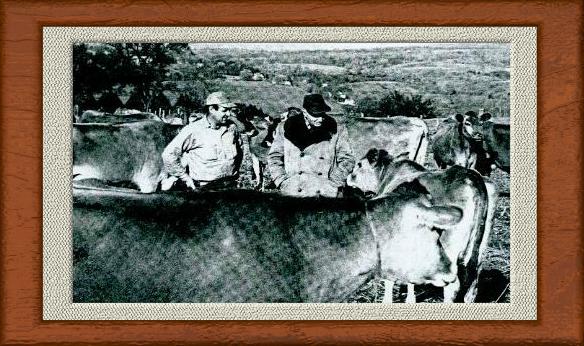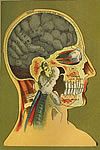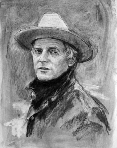|
|
|
|

"If you care to go to school go to the honey bees, fowl, cats, dogs,
goats, mink, calves, dairy cows, bulls and horses and allow
them to teach you their ways, you will gain an insight into physiological
and biochemical medicine not to be learned from medical
books. Verified by observing results in animals, this medicine,
which is passed from generation to generation by word of mouth
enables great numbers of Vermonters to continue carrying heavy daily
work loads and to go on well past the Scriptural
three-score-and-ten years into good physical and mental vigor, good
digestion, good eyesight and good hearing, avoiding senility
to the very end." Dr. D.C. Jarvis
___

Ashes and Snow
___
Dogs Being Trained To Smell Cancer
Animals Can Smell Scents Given Off By Tumor Cells
Updated: 10:27 a.m. EDT August 7, 2002
CLEVELAND -- Researchers have found a new way to hunt for cancer cells,
possibly before even the most sensitive
equipment could detect them.
They're not using expensive hospital equipment, but rather, man's best friend.
Shing Ling, 2, is more than just a furry companion for researcher Michael
McCulloch.
He and other researchers are developing a pilot program to train dogs to
identify
who has cancer.
"(Cancer patients) have a different bouquet of odor that's detectable to
the dog," he
said.
McCulloch collects breath samples for both lung cancer patients and healthy
patients.
Shing Ling is being trained to detect which is which.
"The project is to very carefully measure how good the dog is at distinguishing
between lung cancer samples from a
normal person," McCulloch said.
Dogs have 40 times the number of scent-receiving cells in their noses than
humans have, making them able to sense the
most minute scents given off by tumor cells.
The goal with the dogs is to detect tumors before the most sophisticated technology can.
Shing Ling's trainer commands the dog to tell him which one smells like
cancer. When the dog chooses which one she
thinks has the cancer scent, she taps it with her paw.
After a year and a half of perfecting the training methods, he said Shing
Ling is right 87 percent of the time. But many
doctors won't believe it until real evidence comes in.
McCulloch isn't the only researcher with these ideas. Scientists in Florida
and England are also seeing if the dogs' noses
know.
Copyright 2002 by local6.com. All rights reserved.
|
|
Dogs trained to smell bladder cancer in urine
Man's best friend could help fight disease, scientists
say
Updated: 7:01 p.m. ET Sept. 23, 2004
LONDON - Man’s best friend could also be a lifesaver in the fight against cancer.
Scientists said on Friday dogs can be used to detect bladder cancer by smelling urine.
There is already anecdotal evidence of dogs alerting their unsuspecting owners of skin cancer by persistently sniffing suspicious moles which were later diagnosed as malignant.
Now, in research published in the British Medical Journal, scientists have shown dogs can identify bladder cancer by detecting chemicals in urine emitted by cancerous cells.
“Dogs can be trained to detect some odor characteristics for bladder cancer,” Dr Carolyn Willis, of Amersham Hospital in Buckingham in central England, said in an interview.
Cancer cells are thought to give off organic compounds with distinctive odorous that dogs can detect even in very small quantities.
Willis and her colleagues trained six dogs of varying breeds and ages to identify urine samples from 36 bladder cancer patients among 108 healthy volunteers.
Developing better tests
Each dog did nine tests which involved selecting the
urine from a cancer patient from six other samples by lying down next to
it.
The dogs had an average success rate of 41 percent, which Willis said is significant because it would have been 14 percent by chance alone.
During the training phase of the study, the dogs consistently identified a urine sample from a healthy control patient as cancerous. Further tests confirmed the volunteer did in fact have the disease.
Willis believes dogs could play an important role in helping scientists identify the compounds emitted by cancerous cells, which could then be used to develop better tests.
“The principal aim is to use the dogs to help us find specific markers for cancer,” she said.
“A lot of our research will be geared towards trying to decide what it is the dog has picked up in the bladder cancer samples.”
Bladder cancer is the ninth most common cancer worldwide with 330,000 new cases each year and more than 130,000 deaths, according to the International Agency for Research on Cancer (IARC) in Lyon, France. Smoking is a leading risk factor for bladder cancer.
Willis and her team also plan to use dogs’ smelling ability
to help them identify markers for other types of cancer.
Dogs may be able to sniff out cancer
Thu Jan 12, 2006 10:37 AM ET
|
|
 |
Dogs' keen sense of smell might help in the early diagnosis of cancer
NEW YORK - Dogs' keen sense of smell might help in the early diagnosis of cancer, researchers report in the current issue of Integrative Cancer Therapies. The findings show that trained ordinary household dogs can detect early-stage lung and breast cancers by merely sniffing the breath samples of patients.
"We've seen anecdotal evidence before suggesting that dogs can smell the presence of certain types of cancer," Michael McCulloch, from the Pine Street Foundation in San Anselmo, California, said, "but until now, nobody had conducted a thorough study such as this." Researchers have observed that cancer cells release molecules different from those of their healthy counterparts, and that might be perceived by smell by the highly sensitive dog's nose.
For the study, five dogs, three Labrador retrievers and two Portuguese water dogs, were trained by a professional instructor to respond differently to exhaled breath samples of healthy and cancer patients. "The dogs learned to sit or lie down in front of cancer patient samples and to ignore control samples through the method of food reward," McCulloch explained.
After an extensive, though relatively short, period of training, the McCulloch and his colleagues tested the animals' ability to distinguish cancer patients from controls. The animals were given breath samples from 55 patients with lung cancer, 31 with breast cancer and 83 healthy controls who were not included in the original training sessions. Neither the dogs nor the observers knew the identity of the samples.
McCulloch's group found that the dogs were able to correctly distinguish the breath samples of cancer patients from the those of the control subjects in about 90 percent of the cases, even after the researchers adjusted the results to take into account whether the lung cancer patients were smokers. The dogs were also capable of detecting early-stage lung and breast cancers.
"These results show that there is hope for early detection," McCulloch said. The researchers are planning to conduct further studies on the breath composition of cancer patients to possibly design an electronic device that can do the dogs' job. "I hope people will be interested in pursuing this research," McCulloch added. "It shows that there is definitely something out there."
SOURCE: Integrative Cancer Therapies, March 2006.
Cancer-sniffing dog being cloned in S Korea
Cloned foetuses from the black labrador retriever named Marine were last month implanted into a surrogate mother dog, said Ra Jeong-Chan, president of RNL Bio.
"We are going to see the clones around the end of this month," Ra told AFP.
Marine, who is six and half years old, lost her ability to reproduce when she had her womb removed because of disease.
She is owned by Yuji Satoh, a head trainer at St. Sugar Cancer Sniffing Dog Training Centre located at Shirahama in Chiba prefecture.
Satoh told AFP in Japan that experts from Seoul National University, which created the world's first cloned dog in 2005, had taken some skin samples from Marine and brought them back to South Korea for the project.
"We are making clones of Marine. She is touted as having a world top cancer-sniffing ability. By making her clones, we want to promote studies into cancer-sniffing dogs," Satoh said.
"It's the world's first cloning of a cancer-sniffing dog."
He and the Korean firm, which is coordinating the project, have agreed to produce two clones and train them at Satoh's centre.
One will then be brought back to South Korea for study at the university and the other will stay at the centre.
If the project for two pups succeeds, they plan to produce more.
"We want to make more clones of Marine for worldwide distribution" for studies into canine detection of cancer, Satoh said.
Researchers in several countries are investigating whether dogs have the ability to detect lung, breast, prostate and skin cancer at an early and treatable stage.
They believe cancer cells create a scent not present in healthy cells, which can theoretically be picked up by dogs in breath or urine samples.
RNL Bio's last such project was an order for the world's first commercial cloning of a pet dog -- a request from a US woman to re-create her beloved former pitbull.
The firm said in February it planned to charge 150,000 dollars to clone the pitbull for the California woman, using tissue from her dead pet named Booger.
A Seoul National University team created the world's first cloned dog in 2005, an Afghan hound named Snuppy.
Team leader Lee Byeong-Chun told AFP last week that Snuppy was expected to become a father this month following the first breeding of cloned canines.
Lee's team also produced seven clones of drug-sniffing dogs last year
at the request of the Korea Customs Service. They are said to be easier
to train than ordinary canines.
JCROWS.com
PO Box 172
New Ipswich NH 03071
email jcrow@jcrow.mv.com

|
|

|
 |
|
|
 |
 |